P.D. Martin's Blog, page 5
December 5, 2012
Traditions
My Murderati Wildcard Tuesday post…
In today’s Wildcard Tuesday I wanted to look at traditions. I’ve never been the sort of person who was/is ‘traditional’ or who was really into traditions much at all. Having said that, since I’ve become a mother I find myself feeling much more nostalgic (and warm and fuzzy) about traditions.
Two things that have come up recently…
First off, the photo with Father Christmas. It’s that time of year again, when there’s a Santa in every department store. Last week, my daughter raced home to tell me: “Guess what, mum. I saw Santa at Shopppingtown today.” Shoppingtown is one of our closest shopping centres (mall if the language needs translating!). It was also our local when I was growing up and I remember having many photos with Santa there.
It’s also where we got a photo with Father Christmas for our first Christmas as parents, when Grace had just turned one. So it seems fitting that we go again this year, our first Christmas with Liam.
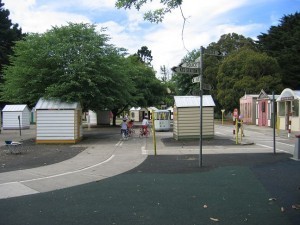 The other nostalgic thing of recent…the Kew Traffic School. This Thursday is my daughter’s sixth birthday, and yesterday afternoon we had her birthday party (actually she’s having three celebrations (!) but this was the party with her friends). Anyway, back in January I booked out the Kew Traffic School on Grace’s request. Yes, she was planning her sixth birthday party soon after her fifth! And yes, you do need to book the Traffic School early for private functions.
The other nostalgic thing of recent…the Kew Traffic School. This Thursday is my daughter’s sixth birthday, and yesterday afternoon we had her birthday party (actually she’s having three celebrations (!) but this was the party with her friends). Anyway, back in January I booked out the Kew Traffic School on Grace’s request. Yes, she was planning her sixth birthday party soon after her fifth! And yes, you do need to book the Traffic School early for private functions.
Anyway, the Kew Traffic School has many memories for me, and for other Melbournians. You see, it’s been around for ages. It’s basically a mini street system complete with traffic lights, a railway crossing, a roundabout, a few stop signs, a school crossing, giveway signs, etc. I remember going there when I was about eight with school as part of bike and road safety education. I had a ball! You take your bike and helmet and off you go. They also open during school holidays, and you can rent the Traffic School for private parties.
Grace’s party there was a definite success – from all perspectives. From the kids’ perspective it’s a great party. You zoom around on your bike or scooter for two hours and get to eat party food. The parents were pretty happy too, and I had many of them grinning as they were leaving and saying: “They’ll sleep tonight.”
And from our perspective, it was a pretty easy birthday. There’s no real need to decorate the venue (we just did balloons at the entrance) and you bring all your own food in so you get to choose what you want to bring and don’t pay ridiculous prices for it. There’s also a BBQ there, so we had sausages going for the second hour, which were a great hit. Yes, the threat of rain was a problem (no contingency plan) and Melbourne is unpredictable even in December. However, yesterday was perfect weather. Warm and sunny, but not too warm.
 Admittedly, I had it easy – Shane did the lolly bags, the cake (a chocolate ripple cake in the shape of a bicycle) and the sausage sizzle. Some of you may remember the fairy princess cake I did for Grace last year?? This year, Shane was keen.
Admittedly, I had it easy – Shane did the lolly bags, the cake (a chocolate ripple cake in the shape of a bicycle) and the sausage sizzle. Some of you may remember the fairy princess cake I did for Grace last year?? This year, Shane was keen.
Anyway, the party was a success and we’ve decided to hopefully hold a party at the Traffic School for Liam when he’s six or seven, too. Although with a May birthday I think it might be too risky!
November 22, 2012
Blast from the past
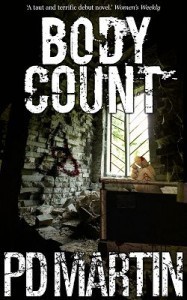 These last few weeks I’ve been experiencing a real blast from the past. You see, a couple of months ago I contacted both my US and Aussie publishers hopeful that the rights to my Sophie Anderson series (Aussie FBI profiler) had reverted back to me.
These last few weeks I’ve been experiencing a real blast from the past. You see, a couple of months ago I contacted both my US and Aussie publishers hopeful that the rights to my Sophie Anderson series (Aussie FBI profiler) had reverted back to me.
Reversion of rights used to be the kiss of death for authors. Generally, no publisher would buy the book again to re-launch it (except perhaps if you went on to write a best seller and your new publisher was keen to acquire your back list). Then, ebooks happened. Now, reversion of rights is actually an exciting prospect for an author. Especially given one of the keys to ebook success is volume — having more than a handful of titles available to build your name and, of course, sales.
So, I was very happy to find the rights had reverted for ALL my Sophie titles with Pan Macmillan Australia. My contract for the US required much longer time frames to be served, but I was hopeful maybe book 1, Body Count, would be up for reversion. Unfortunately, not. Even though it’s out of print in the US, because I gave my North American publisher worldwide rights (excluding a few countries) it just has to have been printed some where recently (or due for a reprint). In the case of Body Count, apparently a reprint is scheduled of the French edition. While it’s great the reprint is happening, it’s frustrating that I’ll only be able to make my Sophie novels available to people in Australia and New Zealand.
This is particularly concerning given we represent such small markets on the global side of things (given our populations), plus so far Aussies have been very slow to adopt Kindles and other ereaders. (I’m not sure about New Zealand’s adoption rate of ereaders.) After some debate, I decided it’s still worthwhile to get them up there. Maybe I can be one of the Aussie authors getting in at the ground level, before Kindles take off!
So, for the past two weeks I’ve been taking another look at Body Count. It’s the first time I’ve read the book since the page proofs, back in 2005. There are a few minor things I’ve always wanted to fix, and other things I’m finding along the way. For example, I really steer away from dialogue tags now (he said, she said) and aim to use descriptions to attribute dialogue instead. To give a very basic example,
“I don’t know, Sophie,” Flynn says.
Might become something like this:
Flynn’s blue eyes fix on me. “I don’t know, Sophie.”
I’m also now mindful of the ebook medium and will be doing one pass entirely with the aim of breaking up a few chapters. I think some shorter paragraphs and shorter chapters work well for the ebook format and help give a book that page-turner feel. Plus, I’m concerned the book starts too slow so I’m hoping to cut out around 5,000 words from the first 1/3 of the book. That’s going to be a tough job, though, and I’ll devote one editorial pass just to that task. Deleting scenes is never easy for an author.
Of course, I’ve also been getting the cover designed. Like it?
Congratulations to the Boroondara winners
On 16 October I posted a blog about how I’d just completed judging the Boroondara Literary Awards – open short story competition. In that blog I talked about the judging process and what makes a good short story. However, I wasn’t able to say much about the winners because it was all hush-hush until the official awards ceremony. Well, I’m just back from that Awards Ceremony so now I can say a little bit more about the entries, and congratulate the winners…
This year’s stories explored a broad range of topics. There were many stories of childhood (particularly coming-of-age stories) and also stories of growing old. Stories of war also featured, ranging from war-time stories to stories of veterans trying to fit in back at home. Important global and local issues that affect us all were also addressed, such as racism, refugee camps and climate change.
A short story competition wouldn’t be complete without touching on the classics of love and death — two incredibly strong emotional drivers that have the ability to create drama when crafted well. Entries also covered other classic genres, such as fantasy, science fiction and crime fiction.
There were also some stories that offered interesting points of view. One told from a tree’s perspective, another a statue, a house, a dog, a ‘simple’ man, and several entries told from a very young child’s perspective.
So, I’d like to congratulate…
The four highly commended stories:
Double Glazing by Kate Rotherham, which took me on an emotional and difficult journey with the mother of an autistic child;
The Angel by Amy Bisset, which offered a refreshing take on point of view, telling a well-crafted story from a statue’s perspective;
Delivered by Sulari Gentill, about a young man who delivered the pink slips during war time (I loved the last sentence of the first paragraph, ‘After all, Gus Merriman delivered death’); and finally
Fighting for Breath by Paul Threlfall, a story with an incredibly strong voice that followed a boxer turned New York taxi driver.
Another story was extremely close to a highly commended prize, so close I wanted to at least mention it. Two Bucks for Living by Jessica Lye was a touching story about a homeless man reunited with his daughter. This story simply needed professional editing for some craft elements to take it to the next level.
Now, on to the first, second and third prizes, plus the Boroondara Prize. These stories were all extremely different, yet each one was powerful in its own way.
The third prize goes to One Day in the Life of a Societal Corpse by Alexandra Coppinger. The writing in this piece is strong, atmospheric and in many ways daring. I’m a stickler for grammar and sentence structure, yet this story’s powerful one- and two-word sentences somehow work. The story gave a moving insight into a protagonist who’s struggling with life, and contemplating death.
The second prize goes to Something was Wrong by Michael Doyle. In this story, the writer has perfectly captured the voice of a five-year-old boy being led to a holocaust gas chamber with his mother. The reader can guess what’s going on, but the child doesn’t. The story is both well-written and touching, and as the highest placed entry from a Boroondara resident, it also wins the Boroondara Prize.
Finally, the first prize goes to what could be described as a more quirky story. While in many ways the language and sentence structure are ‘simple’, this is a perfect reflection of character and voice. Derek Pickle by Aaron Firth Donato is the story of an intellectually handicapped man whose caregiver, his grandmother, dies. Soon after her death Derek decides to go to his first concert, and because his grandmother always told him not to go anywhere without her, he takes her — her ashes, that is. He even makes sure to get her home on time for bed.
Congratulations again to all the winners and the other entrants. Keep writing, and it’s great to see we’ve got such strong writers in Australia.
October 25, 2012
Lost in translation
 About a year ago I came up with an idea for a new novel. It was the kind of idea that kept eating at me, kept calling to me “Write me”. I knew it was an idea I’d get to sooner rather than later, that it would ‘jump the queue’ in terms of the projects I had planned. This is the order I’m supposed to be doing things in:
About a year ago I came up with an idea for a new novel. It was the kind of idea that kept eating at me, kept calling to me “Write me”. I knew it was an idea I’d get to sooner rather than later, that it would ‘jump the queue’ in terms of the projects I had planned. This is the order I’m supposed to be doing things in:
Books 2 & 3 in my Guardian and Wanderer series (Pippa Dee)
Book 2 in my new “RB and The Committee series” (as a follow-on to Hell’s Fury)
Another mainstream drama project (I was hoping to have an agent and a sale by now for my first mainstream drama novel, but alas it hasn’t happened yet).
Then, and only then, would I move onto this ‘new’ idea, something that’s completely different again to what I’ve been writing. It’s a post-apocalyptic YA thriller/action adventure. I know…I’m all over the shop.
However, when I was in bed at night, I’d literally think about scenes from this book. I’d see and hear them in my head, compose the sentences and dialogue. I had the character down — a tough 18 year old who’d been imprisoned since she was 10 because she was a ‘danger to society’. But I didn’t write any of these scenes down. I trusted my subconscious and conscious to let the idea brew, to fully form. But now, I’m not so sure…
I’ve finally answered the call of this book and put all of my 1-3 points above on hold. After a little bit of initial but essential research, I started writing last Thursday. In fact, it’s the first thing I’ve written since we collected Liam in Korea a few weeks ago. And I am also aware that my writing stints are going to be an hour here, an hour there, and then one full day (Thursdays).
Now here’s the problem. The book isn’t coming out at all like it’s been in my head for the past year or so. The main character, instead of being a kick-ass bad-ass chick with a major attitude problem, is turning out to be a young woman who wants redemption for ‘her kind’, who wants to prove she can do more than only destroy society. But I just don’t know. Is the book lost in translation or is this how it is meant to be, how it always would have turned out even if I’d answered its call twelve months ago, or even six months ago? It’s not that I’m not happy with what I’ve written so far and I am only 5,000 words in so it’s hard to tell. But still, why is it so different to what I’d envisaged?
So, now I have to decide…should I go with the flow, what’s coming out on the page, or ditch my 5,000 words and start again trying to be true to the original vision?
October 15, 2012
Boroondara Literary Awards
Back in February I was asked to judge the Short Story Competition of the Boroondara Literary Awards. I knew that in September I’d get a delivery of about 300 stories (1500-3000 words long) and that I’d have a month to read them and pick the winners. No problem. I estimated it would be about 40 hours work over four weeks. Piece of cake.
However, plans changed and during the first week of my four-week judging allocation, we were in Korea picking up our 17-month-old son. Then in the second week I was reading during his naps and at night, but didn’t seem like I was getting very far. That’s when I found out that this year the competition had a staggering 611 entries. Ahhh!
So, what makes a short story good? What separates the winners from those who don’t place?
My first pass of the 611 stories gave me a shortlist of 82 stories. Even this initial shortlist was hard to come up with, because there were many powerful stories that demonstrated the entrants’ strong grasp of the writing craft. From there, I got it down to 36, then 26 and finally I was down to my top 12 stories, from which I chose the winners. Funnily enough, I actually culled the winning story at one point (yes, the one that got first prize), but then brought it back in because I kept thinking about it. You know those kind of stories? It stayed with me.
So, what does make a short story good? It’s difficult to describe the magic formula that makes a short story sing; however for me there are some essential elements. For a start, an opening sentence, paragraph and first page that grabs me. A short story doesn’t have much set-up time and a good short story, like any novel, will constantly drive the reader forward and take you on a journey. Sometimes the driving force is the plot. Sometimes it’s the characters. And sometimes it’s the pure beauty of the written word, the author’s grasp of the writing craft. Of course, ideally these three things come together on the page — a strong plot, intriguing characters and beautiful writing.
There’s still more to a short story than that…there’s the ending. Whether it’s resolution or a shocking twist, the story must feel complete. It was actually the endings of the stories that helped me narrow down the 611 entries to my first shortlist of 82. I found many stories started strong and kept me reading, only to disappoint me in those last few sentences.
One of the difficulties in judging a competition like this is that you’re not always comparing apples with apples. How do you compare a story that’s funny, to a story that’s tragic? Or a story that’s more literary and atmospheric to a murder mystery?
At first, I also found myself drawn to the more shocking, tragic and dramatic stories and I realised that while these stories did pack a punch, I shouldn’t automatically elevate them because they addressed horrific subject matter. These stories were often difficult to read because of their emotionally charged content, namely child abuse, domestic violence, rape and child abduction. In the end, I was mindful of giving these stories equal weighting with the other entries — not elevating them, but not dismissing them either.
Finally, to narrow down my final 12, I gave each story marks out of ten for:
Artistry
Voice and characterisation
Narrative structure
Show don’t tell
Impact
It ended up being a tight race. Unfortunately I can’t talk about the winners yet, because the official announcement isn’t until next month. But I will mention them in November.
It was great to be able to judge this year stories, and I’m looking forward to the awards night and meeting the winning authors.
August 29, 2012
Thank God for Lending Rights
 A very short blog today, mostly because it’s a small but important subject!
A very short blog today, mostly because it’s a small but important subject!
We’re very lucky here in Australia to have a government-run system called lending rights. Each time someone borrows one of my books from a library, the borrow is logged and once a year those borrows are tallied up and I get a cheque in the mail. Nice, huh?
Sure, it’s not like we’re talking a huge payday, but when you’re an author, any cheque is good…welcome, needed…and cashed at the bank within 24 hours.
We have two lending rights programs — public lending rights (PLR) and educational lending rights (ELR). As the name might suggest, public lending rights come from the public libraries that stock your books and educational lending rights come from schools, universities and other educational institutions that buy and hold copies of your book.
I got my most recent PLR and ELR payment fairly recently, as it’s in line with our financial tax year (which for some unknown reason is 1 July to 30 June).
So, I’d like to says thanks to the Aussie Government, and to the library borrowers out there. Sure, it’s a lot less $ per book than what I’d get from a sale, but every little bit helps. And it’s also increasing my reader base, which is a good thing for every author.
August 27, 2012
Salisbury Writers’ Festival
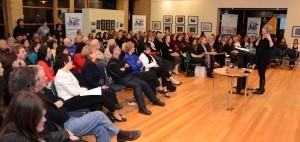 I wanted to talk about the wonderful weekend I just had in South Australia for the Salisbury Writers’ Festival. I think all readers and writers can agree that writers’ festivals are fantastic.
I wanted to talk about the wonderful weekend I just had in South Australia for the Salisbury Writers’ Festival. I think all readers and writers can agree that writers’ festivals are fantastic.
For readers they offer an insight into the writing life and their favourite authors (and characters), and for authors they’re an opportunity to meet fellow authors, meet readers, and generally get out of the cocoon that often surrounds the writing process.
Salisbury Writers’ Festival was no exception!
It’s a smaller festival, one that’s run by a local council about twenty kilometres outside of Adelaide city centre, with many of the attendees being aspiring writers. Whether it’s despite its size or because of its size the event is run incredibly well and I had a ball.
I was lucky enough to be involved in four events over a three-day period. First off, was my keynote address on Friday night. My topic was “The Brave New World for Readers and Authors”. One guess what that focused on! It’s interesting, because here in Australia market penetration of e-readers is very poor. Stats are hard to come by, but when I asked members of the 170-strong attendees if they owned a dedicated e-reader, only about eight hands went up. Like I said, e-readers still aren’t big here, and so part of my address was really about the basics – what an e-reader is, what brands are available in Australia and some of the features. I think they’re like many new technologies, in that people are hesitant to jump on board, especially with something that’s new, something that they don’t see or hear much about. And that’s the case with e-readers here in Australia.
In terms of the author side of things, I talked about the self-publishing revolution that’s been happening in the industry and mentioned some of the bigger success stories, such as JA Konrath and Amanda Hocking. During my research I found a quote from JA Konrath that I absolutely LOVED. He was quoted in a USA Today article as saying: “Traditional publishers are just serving drinks on the Titanic.” Man, I love that quote! So much so, that I wanted to share it here in case you haven’t heard it before.
Then, on Saturday I was on two panels, one titled Pathways to Success, which had four of us sharing our experiences of getting published. Dan McGuiness, who writes graphic novels aimed at 8-12 yro boys, had a very interesting success story. Basically, he went to a pub one night that was an ‘arty’ pub with readings and the like, and showed a woman his drawings. She asked if he could write a book in that style, and he said “sure”. That woman was an editor at Scholastic and she signed him up for his Pilot and Huxley series. Not many authors find success walking into a pub and it definitely makes for one hell of a good story!
I also stood in for a sick panellist for “Pathways to the Future”, and as you’d expect the discussion centred around ebooks, social networking, blogging, etc. It was a lively discussion with one blogger/author, one publisher, a digital publishing expert and little old me.
Although there were other very interesting events on for the rest of the day, the conversation we’d started at the panel was so interesting we continued it over coffee. That’s one of the things I love about writers’ festivals – meeting other writers and people in the publishing industry and just hanging out.
My weekend dance card finished with a master class that I ran from 9.30-3pm on Sunday. My aim when I run any sort of class is to give attendees information about the writing craft that I feel would have helped me get published sooner, if only I’d discovered these pearls of wisdom a couple of years earlier. I think everyone enjoyed the class.
There’s also something kind of nice about staying in a hotel, especially if you don’t tend to travel much for work. So at night I was able to kick back, read a bit on my Kindle and watch a bit of TV. Nice.
August 3, 2012
Just do it
I’ve always been the kind of writer who LOVES applying expressions like this to my writing…
Just do it!
Bum on chair!
Focus!
Never surrender!
I eat those phrases up for breakfast! (Sorry, I know that’s way too many exclamation marks, not to mention clichés, but they need to be there.)
I’ve also been lucky enough that I’ve never really suffered from ‘writer’s block’. In fact, the hard-ass part of me says writer’s block is self-indulgent. Now, I’ve probably got loads of readers (well, the authors) up in arms at this point. I know there will be lots of people who disagree about writer’s block.
The thing is, I’m not saying there aren’t days (or even weeks) when writing seems harder than normal—sometimes WAY harder. But, I’m a practical kind of girl, so I either write through it (eventually it starts flowing again) and edit later, or sometimes I move projects all together. That way, I’m at least writing. Besides, at this point I know I can finish a novel, so it’s not like I’m going to wind up with loads of unfinished manuscripts. It’s just a temporary focus shift.
I did this earlier this year. My plan for 2012 was to finish my mainstream drama novel and then while I was querying agents, I’d work on my Pippa Dee novels as part of my ebook strategy. But after I sent my mainstream novel to Beta readers, there was one problem I simply couldn’t decide how to solve. There was one character who everyone disliked. But what to do with her?
So I guess that was kind of writer’s block, but it didn’t feel like it because I decided to move on to my Pippa Dee novels while I waited out the decision. I could let it tick over in my subconscious. No way was I going to let it interfere with my productivity. Told you I was practical.
So I focused on The Wanderer and Grounded Spirits and once they were finished and up on Amazon, I moved back to Crossroads and Deadends. Two weeks ago I finally finished the editing process and started querying agents. Remember my blog on the writer’s rollercoaster?
Anyway, obviously the querying process has taken up a chunk of time over the past two weeks, but I still feel extremely unproductive. And I’ve been bringing out the big guns, internally telling myself to:
Just do it!
Bum on chair!
Focus!
Never surrender!
But, to no avail. Well, not much at least.
However, it’s not writer’s block. In fact, when I do spend time on my current work in progress (the follow-on to The Wanderer) it flows very easily and I’m excited by it. But for some reason I’ve really been letting the distractions rule these past two weeks. Facebook, emails, scheduling Amazon freebies, and who knows what else? Where have the days gone?
And there have also been some days, when I haven’t felt like writing or trying to write at all. I mean, the rest of this year I’ve been eating lunch at my desk to maximise my work time. Seriously! With Grace starting school in February this year and my shift to ebooks, this has been my year for working hard.
So what’s going on? Where’s my bad-ass writer gone?
I think part of the problem is when I finished Crossroads and Deadends I was conflicted about what to work on next. My 2012 ‘project plan’ says next in line is The Guardian Arises, book 2 in my Wanderer and Guardian trilogy under Pippa Dee. Problem is, sales of The Wanderer and Grounded Spirits have been such a small percentage of the sales of my PD Martin stuff, that I’ve realised that middle grade/YA fantasy novels aren’t the most popular ebooks. So, from a financial point of view, I probably should work on the follow-up to Hell’s Fury, but that book will take me about six months to write, whereas I reckon I can write The Guardian Arises in six weeks, especially because I’m already 20,000 words in and it’s officially middle grade so will probably be around 50,000 words.
Something’s gotta give. I think maybe the answer for me is to go away for a couple of days without internet. That’d sort me out!
July 9, 2012
Rediscovering an old love
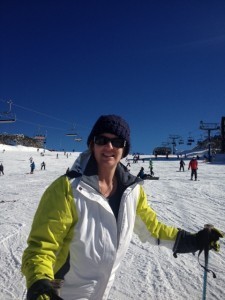 For my Wildcard Tuesday at Murderati, I wanted to look at rediscovering old loves—not lovers (!), that’s an entirely different sort of blog
For my Wildcard Tuesday at Murderati, I wanted to look at rediscovering old loves—not lovers (!), that’s an entirely different sort of blog 
I’ve been thinking about this a lot in the past week, as I prepared to go skiing for the first time in over 12 years. Maybe longer, actually. I thought it had been 10-12 years but if I do the maths it’s probably more like 14 years. That’s a long time. Particularly given I used to LOVE skiing.
So, what stopped me from pursuing my love? I’m afraid it’s plain and simple – money. In fact, if I had money, I’d definitely ski every season, probably several times a season. I’m not sure what skiing is like in other parts of the world, but here in Australia it’s an extremely expensive pursuit. A day lift pass at Mt Buller is $108, then there’s ski rental, clothing, accommodation, etc. etc. Not really in the budget of most authors.
This trip was actually spurred on by my daughter and my dad. Grace has wanted to ski for a couple of years (since she was 3), and Dad was going up (also for the first time in 10+ years) with his new wife and step daughter. They made me an offer I couldn’t refuse; they’d pay for all of Grace’s expenses, including ski school. And so, we planned our two-night, three-day trip.
It was Grace’s second time ever seeing snow and her first time skiing. I hoped she would love it, but we took it easy, booking her in for the afternoon session on the first day. I warned her that falling was part of skiing and not to worry about it! But she’s not very fond of falling, so I was worried it would completely put her off.
It felt a little weird leaving her in the ski school. While Grace does go to school now, she’s never been to day care or a holiday program – the benefits of working from home. However, once she was settled I hit the slopes. I had two hours of skiing time to myself. After only two green (easy) runs, I felt ready and confident enough to hit the blue (intermediate) slopes. I should say, I was never an advanced skier, mostly because I would only get up for a couple of days a season. That money thing again. So I was always a blue run girl, rather than a black (advanced) skier.
Anyway, it was definitely a case of rediscovering an old love. We were blessed with the weather … blue skies and sunshine. I only had two hours that first day, but I made the most of it up on the top of the mountain before heading back to pick up Grace. Then Grace went on her first ever chairlift with me, and I took her down a long (easy) run. I was glad that the skiing process had come back to me enough that I felt confident taking her down with me. And she LOVED it. It also gave her the incentive to learn to ski, because she wants to go down the mountain fast like Mummy.
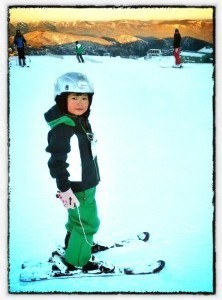 The next day she was keen for an all-day lesson (9-3.30). I dropped in on her a few times and got some great video of her learning to snow plough. In the afternoon it was up the chairlift with her again for a hot chocolate with my dad, then up a little higher on the mountain. This was when this pic was taken.
The next day she was keen for an all-day lesson (9-3.30). I dropped in on her a few times and got some great video of her learning to snow plough. In the afternoon it was up the chairlift with her again for a hot chocolate with my dad, then up a little higher on the mountain. This was when this pic was taken.
So, I’ve rediscovered an old love. I’m not sure when I’ll be up again (comes back to the lottery/best seller solution) but I hope it won’t take me another 14 years.
July 5, 2012
Back on the rollercoaster
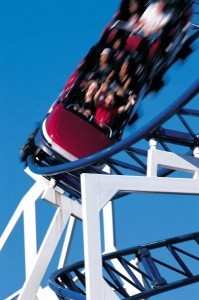 And so, the rollercoaster begins…again. This week I finally finished my mainstream drama/fiction project. Hooray! It’s been a long time in the making, mostly because I had to come off it several times last year to take paid freelance jobs (ghost writing, corporate stuff, etc.) and this year I’ve been focusing on my ebook strategy. However, I launched myself into the re-write in mid-May and now it’s done. It’s a wonderful feeling to be finished the novel and to be happy with it (for the most part).
And so, the rollercoaster begins…again. This week I finally finished my mainstream drama/fiction project. Hooray! It’s been a long time in the making, mostly because I had to come off it several times last year to take paid freelance jobs (ghost writing, corporate stuff, etc.) and this year I’ve been focusing on my ebook strategy. However, I launched myself into the re-write in mid-May and now it’s done. It’s a wonderful feeling to be finished the novel and to be happy with it (for the most part).
The bad news is, I’m on the rollercoaster again. Sigh. I really don’t know if I’m mentally prepared for the lows as well as the highs. Sigh. You see, while I’m committed to the ebook path for some of my books (some genres), I feel that I’d like to give traditional publishing a go with my mainstream drama. Which means finding an agent.
Yup, THAT rollercoaster. Picking a shortlist of agents based on their recent sales and the authors they represent, then querying one to three at a time. And that’s a whole other thing—so many agents don’t like or insist on not being part of multiple submissions. But if you do one agent at a time, it could take you a year or more to get through your top 10! Of course, any author hopes that their first or maybe second pick will leap at the opportunity to represent them. But it’s getting harder and harder, even for authors with a publishing record (like me) to get an agent to take the plunge. I’m in a time warp, back in 1998-2004, when I was an aspiring author, looking for an agent or publisher. Looking for my first break. And in some ways, it feels like I’m back at square one. Sigh.
This week I start querying, and I’m both excited and petrified. I know I need to tighten the query letter and synopsis, so that’s my next focus. Although the timing truly sucks. This week and next week is school holidays in Victoria, Australia so I’m a full-time mum for the next two weeks. Not that I can complain—I’m also going skiing. In fact, when this post goes live I’ll be at Mt Buller, skiing for the first time in 10 years. And it will be my daughter’s first time ever. Exciting!!! Can’t wait. Although it does also mean I might not be able to respond to comments until the weekend (or perhaps I’ll be very brief from my Smartphone). Anyway…
Being an author truly is a rollercoaster—or more accurately several rollercoasters, sometimes happening simultaneously.
First, there’s the creative process itself, the creative rollercoaster. One minute you think that sentence, paragraph, chapter or book is brilliant; the next, you think it’s crap. And those highs and lows just seem to be part of the creative process. I’m still really on this rollercoaster for Cross Roads and Dead Ends (working title). I said above that I’m happy with it (for the most part), but like many authors I question whether you can ever be truly 100% happy with a book. I could edit and tweak for eternity, I think.
Then there’s the agent rollercoaster. The rollercoaster I’m currently on. Once you get an agent, there’s the publisher rollercoaster. Will your agent’s first round of publishers be interested? Will they all be so interested that it goes to auction (best-case scenario) or will they all pass (obviously worst-case scenario)?
Then there’s the rollercoaster once your book is published, the marketplace rollercoaster. Will the reviewers like it? Will the readers like it? And even if both reviewers and readers rave about it, will it actually make a dent in terms of sales? The making-a-living-as-an-author rollercoaster. See? Lots of rollercoasters!
Ultimately, my aim as an author is to take my readers on a rollercoaster, but with very different highs and lows. In the case of Cross Roads and Dead Ends, I want my readers to experience the characters’ pain, their loss, and feel that sense of resonance. I want to take my readers to soaring heights, but also sometimes the depth of despair. But that means I have to go on all the other rollercoasters first. So here I go. Ready for the adrenaline high and the possible motion sickness.
Deep breath…



